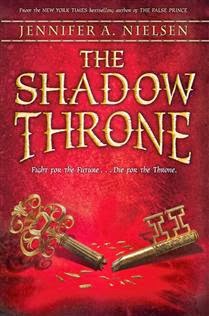Summary: In a discontent kingdom, civil war is brewing. To unify the divided people, Conner, a nobleman of the court, devises a cunning plan to find an impersonator of the king's long-lost son and install him as a puppet prince. Four orphans are recruited to compete for the role, including a defiant boy named Sage. Sage knows that Conner's motives are more than questionable, yet his life balances on a sword's point — he must be chosen to play the prince or he will certainly be killed. But Sage's rivals have their own agendas as well.
As Sage moves from a rundown orphanage to Conner's sumptuous palace, layer upon layer of treachery and deceit unfold, until finally, a truth is revealed that, in the end, may very well prove more dangerous than all of the lies taken together.
An extraordinary adventure filled with danger and action, lies and deadly truths that will have readers clinging to the edge of their seats.
This is a Bildungsroman for the modern age with sword-fighting, deception, bloodshed, corruption, and greed. Sage is an orphan who is being trained by a nobleman to deceive the entire kingdom and become the prince. The book is PG, though there is violence present in the text. This is a protagonist that pre-teen readers can get behind; he's stubborn, street-smart, clever, and even a little obnoxious.
Although it is a great YA read, my only complaint is the narrative style. Sage spends about 70% of the book confused, angry, and afraid as he and the other boys are essentially held hostage by a corrupt nobleman. And then, suddenly, when it's revealed that Sage is Prince Jaron, Sage is suddenly intellectual, cunning and very much not confused. The shift in his character was too abrupt, even for me. It felt as if Nielsen had decided partway through the novel that Sage is actually Jaron. I think the book (and this major climatic reveal) would have been more effective told from a third-person, omniscient narrator, rather than in third-person from Sage's POV. Most of the shock factor was lost due to the narrative style. His character's reactions for most of the book are just not plausible if he's known the whole time that he is the prince.
Other than that, I enjoyed reading The False Prince. It's a great series, especially for boys. The length isn't daunting for reluctant readers. It is also notable that the characters are mostly male. There are only two prominent women in the book (a Princess and a servant girl), both of whom have small roles and could be potential love interests, though there is no romance angle in this first book. Some young male readers prefer to read about male readers, so make of that what you will.
A great start to a great series. Nielsen's storytelling is riveting and memorable.
3 Stars.
Although it is a great YA read, my only complaint is the narrative style. Sage spends about 70% of the book confused, angry, and afraid as he and the other boys are essentially held hostage by a corrupt nobleman. And then, suddenly, when it's revealed that Sage is Prince Jaron, Sage is suddenly intellectual, cunning and very much not confused. The shift in his character was too abrupt, even for me. It felt as if Nielsen had decided partway through the novel that Sage is actually Jaron. I think the book (and this major climatic reveal) would have been more effective told from a third-person, omniscient narrator, rather than in third-person from Sage's POV. Most of the shock factor was lost due to the narrative style. His character's reactions for most of the book are just not plausible if he's known the whole time that he is the prince.
Other than that, I enjoyed reading The False Prince. It's a great series, especially for boys. The length isn't daunting for reluctant readers. It is also notable that the characters are mostly male. There are only two prominent women in the book (a Princess and a servant girl), both of whom have small roles and could be potential love interests, though there is no romance angle in this first book. Some young male readers prefer to read about male readers, so make of that what you will.
A great start to a great series. Nielsen's storytelling is riveting and memorable.
3 Stars.

| 
|

No comments:
Post a Comment